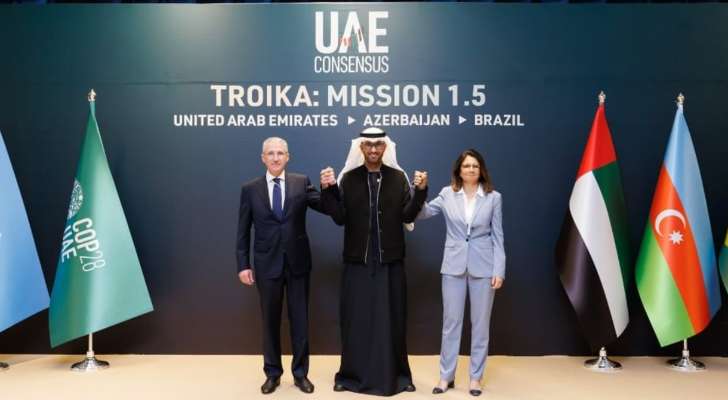Three countries, the UAE, Azerbaijan, and Brazil, have declared their intention to host or are preparing to host United Nations climate talks. On Tuesday, they formed a “troika” in order to push for an international agreement to limit global warming to 1.5 degrees Celsius.
The United Arab Emirates hosted COP28 conference last year in Dubai, while Azerbaijan is preparing to host the summit this year followed by Brazil in 2025.
The 198 countries that are signatories to the Dubai Agreement have delegated the three countries to work together to develop a roadmap for reducing global warming to remain at 1.5 degrees Celsius, which is a major climate goal threatened by greenhouse gas emissions worldwide.
According to the President of COP28, Sultan Al Jaber, in a statement, “The Troika helps ensure our possession of the necessary cooperation and continuity to keep the North Star represented by 1.5 degrees Celsius on the horizon from Baku to Belize and others.”
According to United Nations estimates, current climate commitments indicate that temperatures worldwide are projected to increase by approximately 2.5 to 2.9 degrees Celsius during the current century.
According to the international governmental body focused on climate change, it is projected that the threshold of 1.5 degrees Celsius will likely be reached between the years 2030 and 2035.
Based on the final agreement reached during the “COP28” conference, the partnership referred to as the “Troika of the COP Presidencies” must significantly enhance international cooperation and the global environment that enables the stimulation of ambitions in the next round of nationally determined contributions.
The agreement also stated that this comes “with a vision based on increasing action and implementation during this crucial period, while keeping the limit of 1.5 degrees Celsius within reach.”
Climate finance
During COP28 summit, participating countries agreed to move away from fossil fuels but without making any progress in terms of releasing funding for the benefit of developing countries, which remained a contentious issue during the negotiations.
This issue is expected to be central during the COP29 conference in Baku, where a new target for financial support from developing countries is expected to be determined in order to address climate change.
According to the Organization for Economic Cooperation and Development, wealthy countries have been delayed by approximately two years in fulfilling their initial commitment to allocate annual climate financing of $100 billion.
According to the United Nations’ Climate Finance Experts Group in 2022, developing countries (excluding China) will need to spend approximately $2.4 trillion annually on clean energy and climate change mitigation by 2030. This amount is four times higher than the current levels.
Mukhtar Babayev, the Azerbaijani Minister of Environment, who will preside over the COP29 conference, stated, “We are committed to utilizing our strengths to bridge the gap between the developed and developing worlds as the host of COP29 in order to accelerate efforts to keep the 1.5-degree Celsius target within reach.”
He added that
“the key to this will be identifying a new climate financing goal that reflects the extent and urgency of the climate challenge.”


















